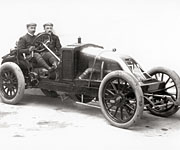|
Renault’s win on Isle Notre Dame in the last
week of June was, by their reckoning, their 100th win in Grand Prix
Racing. As Fernando Alonso pulled himself out of his car, its
Michelin tires covered in the bits of rubber and dust picked up in
his victory lap, it seems the stars aligned. How? June also
marked another important hundred – the centenary of Grand Prix
racing itself. Organized by the French Automobile Club and
staged around
Renault's First Grand Prix Winner While ‘Grand
Prix’ racing did indeed start in France in 1906, the French (though
not Renault the company) were already established as savvy
competitors in international motorsport when the event took place.
That first Grand Prix
was inspired by a series that had run the previous five years, the
brainchild of newspaper publisher James Gordon Bennett Jr. The
scheduling of the first Grand Prix was the result of rule disputes,
and because fatalities in the 1903 Paris-Madrid race - including the
death of Marcel Renault, one of Renault’s founders – resulting in
pressure to hold motor races on closed circuits. Bennett's
enthusiasm for sports extended to his sponsoring of several highly
popular events amongst the wealthy of the time that allowed his
newspapers the inside story and exclusive interviews with the events
participants. After seeing a Polo match in
In 1906, Bennett
provided the funds and trophy for a gas balloon competition,
launched with great fanfare from the
The latest in a long line of winners
Much has changed in the 100 years since that first Grand Prix: two world wars, the establishment and failure of many manufacturers and teams, the establishment of Formula 1 racing in 1950, and the rise and fall of one world champion after another – their careers often ending in tragedy. And the cars themselves could hardly be more different. Other than exploding fuel in a combustion chamber and a four-wheeled configuration, today’s Formula 1 racer employs technology well beyond the capabilities of the finest engineers and scientists working at the dawn of the previous century. Computers, alloys, composites, telemetry – today’s car would be difficult to fathom for Ferenc Szisz (the 1906 winner) and his team.
|
|
Visit Our Forums |
|
Autopuzzles is chock-full o’ articles and commentary on cars, old and new alike. The puzzles are refreshed often throughout the month; feature articles are monthly.
Marque Spotlight: AMC
|



